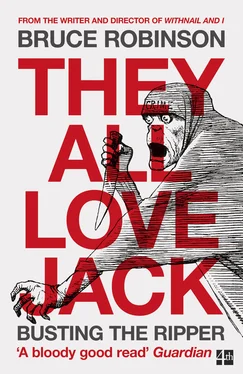An alternative view of this ‘missionary work’ was recorded by a Swedish cleric called Charles Lumholtz in Victoria in 1888: ‘To kill a native of Australia is the same as killing a dog in the eyes of the British colonist.’ Expanding his critique, Lumholtz writes: ‘Your men made a point of hunting the Blacks, every Sunday [presumably after church] in the neighbourhood of their cities … systematically passing the whole day in that sport , simply for pleasure’s sake [his emphasis].’
And what a pleasure it must have been: ‘A party of four or five horsemen prepare traps, or driving the savages into a narrow pass, force them to seek refuge on precipitous cliffs, and while the unfortunate wretches are climbing at their life’s peril, one bullet after another is fired at them, making even the slightly wounded lose their hold, and falling down, break and tear themselves into shreds on the sharp rocks below.’27
Cracking shot, Johnny! Thank you, sir!
‘Although local law (on paper) punishes murder,’ continues Lumholtz, ‘it is in reality only the killing of a white man which is called murder’ (again, his emphasis).
Just who did these Christian civilisers think they were kidding? From which of their Ten Commandments did they consider themselves exempt? You can stuff all that twaddle, old boy. They’re infidels with a different god.
Which unquestionably was true. All tanned foreigners in receipt of British lead were subject to the delusion of a different god (it was only their gold that was real). In India they had one god with three heads, and in England we had three gods with one head: the Father, the Son, and the Holy Ghost. Consequently, it’s quite likely that God looked more like a British officer with half a bear on his head than a man with a bone through his nose.
Twenty-five thousand black bears a year were slaughtered to make hats for the British Army, and fashionable London ladies liked their hummingbirds skinned alive, a technique which apparently added lustre to the chapeau .28
Meanwhile, back in Africa, where the degraded races wore fur and feathers, white men were endlessly hacking at jungle to get at the loot. This was dark and dangerous territory; the continent was still largely unexplored. It was therefore always possible to face sudden confrontation with wild and dangerous men. There was a high chance, for example, of Sir Cecil Rhodes, or Major R.S. Baden-Powell, suddenly springing upon you from the thicket.
Baden-Powell was one of Wolseley’s breed of chaps, ‘an ambitious little man’ who on the side ‘enjoyed dressing up at concert parties and singing in a falsetto voice’. He was also known to enjoy the company of Boy Scouts.
Powell marched his column of fighting men from the beaches of the Gold Coast into deep up-country, his task once again ‘to bring back the gold’ and to destroy the religious practices of the Ashanti. When they got to their destination, a town called Kumasi, the King of the Wogs was asked to produce 50,000 ounces of gold, and spare us the mumbo-jumbo. Only six hundred ounces were forthcoming, creating a bit of a letdown amongst the visitors, who were already half-dead from the march. Baden-Powell concluded that the King and his mother should be taken back to the coast in default.
No one in Kumasi liked the idea of this, because ‘The Queen Mother, as with many African peoples, was an extremely important figure in the hierarchy.’ Obviously a peculiar lot. Notwithstanding that, Baden-Powell and his boys set about the business of teaching these heathens a history lesson of the type untaught in British schools. In their rage for gold they battered their way through temples and sacred mausoleums, pillaging anything of value in an ‘orgy of destruction that horrified the Ashanti who witnessed it’.
With their royal family as prisoners, the Africans stood by ‘like a flock of sheep’. There was not much for the civilisers to do before bidding their farewells except to ‘set fire to the holiest buildings in town’. ‘The feeling against the niggers was very intense,’ wrote Powell, ‘and the whites intended to give them a lesson they would not forget.’29
Some of them haven’t.
The other side of the continent was of no less colonial interest, but here things weren’t going so well. All the ingredients of a major imperial cock-up were in situ , focusing on a city in the southern Sudan called Khartoum. The Sudan had been annexed by the British, but now they wanted out. On paper this looked relatively easy: bring in the camels, evacuate all the people on our side, get them back to Egypt, and we’ll sort out the details later.
George Eliot’s brilliant aphorism, ‘Consequences are without pity’ – or words to that effect – proved its fidelity here. Before anyone knew it, Khartoum was under a siege that was to last 317 days. An army of 30,000 religious fanatics under the messianic Mahdi, a sort of Osama bin Laden of his day, wanted to kill everyone in Khartoum and take the city back into the bosom of Mohammed. But unhappily, they faced the indomitable might of the British Empire, which in this case was one man. His name was Major General Charles George Gordon.
From time to time I agree with the dead, even with a reactionary conservative politician. After Gordon’s death amid the disaster of Khartoum, Sir Stafford Northcote got on his feet in the House of Commons and told nothing less than the truth. ‘General Gordon,’ he said, ‘was a hero among heroes.’ I find nothing to contradict that. Gordon was a hero, no messing with the word. ‘If you take,’ continued Northcote, ‘the case of this man, pursue him into privacy, investigate his heart and mind, you will find that he proposed to himself not any idea of wealth and power, or even fame, but to do good was the object he proposed to himself in his whole life.’
Gordon’s government betrayed him. As far as the Conservatives were concerned – and again they were probably right – the villain in the whole affair was an irascible old Liberal the serfs had made the mistake of re-electing. Prime Minister William Gladstone was a man of compassion and large mind, but he couldn’t make it up over the Sudan. ‘God must be very angry with England when he sends us back Mr Gladstone as first minister,’ wrote Lord Wolseley. ‘Nothing is talked of or cared for at this moment but this appalling calamity.’30
Wolseley doubtless felt his share of guilt. It was he who had sent Gordon, at the age of fifty, to sort out the problem of the southern Sudan. Throughout the searing heat of that dreadful autumn of 1884 Gordon wrote frequently to London: send us food, send us help, send us hope. Despite the headlines and the Hansards full of unction, the dispatches went unheeded, and Gladstone’s vacillations became the tragedy of Khartoum.
The infidel was closing in, at least to the opposite bank of the Nile. This didn’t cost Gordon any sleep: he had a better God than theirs, and more balls than the lot of them put together. ‘If your God’s so clever,’ he taunted, ‘let’s see you walk across the Nile.’ Three thousand tried it, and three thousand drowned. The rest kept an edge on their scimitars, waiting for the word of the Almighty via the Mahdi. They were a particularly fearsome, in fact atrociously fearsome, mob. According to British propagandists they didn’t give a toss about death, because heaven was its reward. They apparently believed that saucy virgins were going to greet them in Paradise, handing out the wine and honey. I have to say, it doesn’t sound much different from the Christian facility, although our corpses don’t get the girls.
January 1885 baked like a pot. The 14,000 inhabitants left in Khartoum had eaten their last donkey, and then their last rat. Nothing was left to constitute hope but relief from the British, and failing that, death.
Читать дальше











